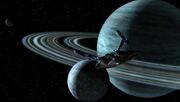mNo edit summary |
m (r2.7.5) (Bot: Modifying sr:Орбита) |
||
| (24 intermediate revisions by 17 users not shown) | |||
| Line 1: | Line 1: | ||
| − | [[ |
+ | [[File:Andoria.jpg|thumb|[[Andoria]] orbiting a [[gas giant]]]] |
| + | [[File:Miri Earth remastered.jpg|thumb|The {{USS|Enterprise|NCC-1701}} in orbit of an [[Earth]]-like planet]] |
||
| ⚫ | |||
| + | [[File:Nimbus 1.jpg|thumb|''[[Nimbus 1]]'' in polar orbit]] |
||
| ⚫ | |||
| − | A [[starship]] uses a form of orbit to maintain its relative position. The term orbit is also used to define the |
+ | A [[starship]] uses a form of orbit to maintain its relative position. The term orbit is also used to define the flight path of a [[planet]] within its own [[star system]]. ({{TNG|Force of Nature}}) |
| − | In [[2269]], [[Spock]] detailed to [[Abraham Lincoln]] that the |
+ | In [[2269]], [[Spock]] detailed to [[Abraham Lincoln]] that the {{USS|Enterprise|NCC-1701}} was 643 miles, 2,021 feet, 2.04 inches above the surface of [[Excalbia]]. ({{TOS|The Savage Curtain}}) |
| − | There are several forms of orbit |
+ | There are several forms of orbit; some of them are referred to by [[Starfleet]] personnel with names like "standard orbit" or "high orbit." |
| − | * |
+ | *'''[[Synchronous orbit]]''': This form is used by a starship to maintain position towards a specific point on a planet's surface. The ship's velocity will be the same as the rotation speed of the planet. ({{TNG|Relics}}) |
| ⚫ | *'''High orbit''': A form of orbit in which the starship maintains a large distance from the planet's surface for safety reasons but is still close enough to use the [[transporter]]. ({{VOY|Ex Post Facto|The Omega Directive}}) The {{USS|Voyager}} parked in high orbit over [[Earth]], when it visited the planet in [[1996]], at an altitude of 20,000 kilometers. ({{VOY|Future's End}}) |
||
| + | *'''Polar orbit''': A type of spacecraft orbit that passes within 22,300 miles of the geographic poles of a planet. An image of the ''[[Nimbus 1]]'' [[artificial satellite|satellite]] in polar orbit of [[Earth]] was seen in the [[USS Enterprise (NCC-1701) library computer|USS ''Enterprise'' library computer]]. ({{TOS|The Cage}}) A polar orbit may also be used as an [[Evasive maneuvers|evasive maneuver]], since [[Electromagnetism|electromagnetic]] interference from a planet's magnetic pole may disrupt starship [[sensor]]s. ({{TNG|The Hunted}}) |
||
| ⚫ | |||
| ⚫ | * |
||
| ⚫ | |||
| − | * '''Geostationary orbit''': This term refers to an orbit in which the starship remains stationary with respect to a point on the planet's surface. |
||
| ⚫ | |||
| − | |||
| ⚫ | |||
==See also== |
==See also== |
||
*[[Tidal locking]] |
*[[Tidal locking]] |
||
| + | |||
| + | ==External links== |
||
| + | * {{wikipedia}} |
||
| + | * {{wikipedia|Synchronous orbit}} |
||
| + | * {{wikipedia|Geostationary orbit}} |
||
| + | |||
| + | [[Category:Geoscience]] |
||
| + | |||
[[de:Orbit]] |
[[de:Orbit]] |
||
| + | [[fr:Orbite]] |
||
| + | [[it:Orbita]] |
||
| + | [[ja:軌道]] |
||
| + | [[nl:Baan]] |
||
| + | [[sr:Орбита]] |
||
Revision as of 18:18, 15 October 2014

The USS Enterprise in orbit of an Earth-like planet

Nimbus 1 in polar orbit
Orbit is a term used to describe the flight path of an object in space which has a repetitive motion and has a distinct center with respect to its flightpath.
A starship uses a form of orbit to maintain its relative position. The term orbit is also used to define the flight path of a planet within its own star system. (TNG: "Force of Nature")
In 2269, Spock detailed to Abraham Lincoln that the USS Enterprise was 643 miles, 2,021 feet, 2.04 inches above the surface of Excalbia. (TOS: "The Savage Curtain")
There are several forms of orbit; some of them are referred to by Starfleet personnel with names like "standard orbit" or "high orbit."
- Synchronous orbit: This form is used by a starship to maintain position towards a specific point on a planet's surface. The ship's velocity will be the same as the rotation speed of the planet. (TNG: "Relics")
- High orbit: A form of orbit in which the starship maintains a large distance from the planet's surface for safety reasons but is still close enough to use the transporter. (VOY: "Ex Post Facto", "The Omega Directive") The USS Voyager parked in high orbit over Earth, when it visited the planet in 1996, at an altitude of 20,000 kilometers. (VOY: "Future's End")
- Polar orbit: A type of spacecraft orbit that passes within 22,300 miles of the geographic poles of a planet. An image of the Nimbus 1 satellite in polar orbit of Earth was seen in the USS Enterprise library computer. (TOS: "The Cage") A polar orbit may also be used as an evasive maneuver, since electromagnetic interference from a planet's magnetic pole may disrupt starship sensors. (TNG: "The Hunted")
Terok Nor (later Deep Space 9), was in synchronous orbit of Bajor during the Occupation. (DS9: "Emissary", "Necessary Evil", "Wrongs Darker Than Death or Night")
